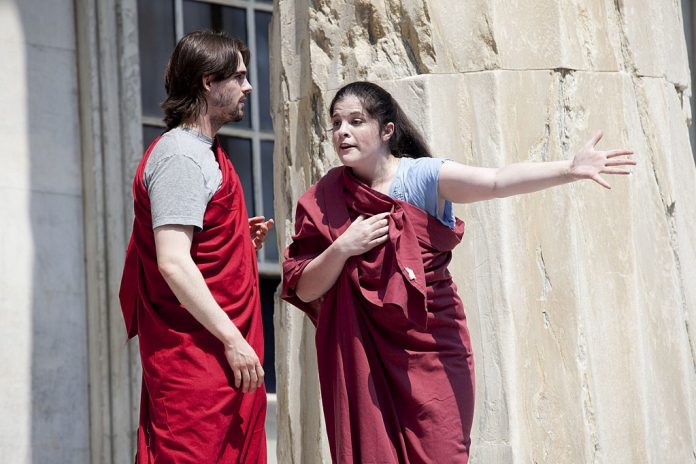(L to R) Alex Falone and Alissa Nesson act in Northeast writer/director Mike Tait’s “Saucy Biblical Tales” on Saturday, August 20 at the Second Bank of the United States, 420 Chestnut St.
Kevin Cook/for the Times
As a Northeast Philadelphia Catholic through and through, Michael Tait has heard plenty of Bible stories over the years.
In fact, thanks to his many years of schooling at St. Bernard’s parish grade school, Father Judge High School and Holy Family University, Tait probably knows more than most about the good book.
Even so, the biblical tales that seem to interest him most these days are not the ones they teach you on Sundays.
The 38-year-old playwright, lyricist and director is examining a more eroticized side of the Old Testament in his latest musical production, Saucy Biblical Tales, which will debut from Sept. 2 to 10 as part of Philly Fringe, the alternative-style spin-off of the annual Philadelphia Live Arts Festival.
The venue will be the 150-seat theater at the Ethical Society of Philadelphia, 1906 S. Rittenhouse Square. Admission costs $20 for the two-hour performance.
According to Tait, “the Fringe” is an ideal vehicle for promoting Saucy because of the show’s socially, culturally and theologically controversial subject matter.
“When I first tried to produce this last year, I had some performers back out,” he said. “They were a little too religious, and my show was a little too blasphemous.”
Tait, who describes himself as “spiritual but not religious,” has no such qualms. In the past, he notes, many mainstream shows have been vilified for challenging conventional depictions of religion, only to gain widespread acceptance and acclaim in time.
“There were people protesting Jesus Christ Superstar when it first went up (onstage),” he said.
The premise of Tait’s show is to portray selected biblical stories all too literally and to comedic levels, with narration by the forthright Father Rufus.
“Basically, the priest, Father Rufus, is taking a different tack on preaching the Bible,” Tait said.
“Most people take the word of God literally, like you believe it or you go to hell. But (the Bible has) legitimate attempts at history, areas that are purely folk tale and sections where there is beautiful poetry going on. (Father Rufus) takes the approach that there are also areas that are a little racy, but (priests) don’t usually get into that.”
One of the good father’s lessons, for example, is the story of Abraham and the slave girl. As the story goes, Abraham’s wife, Sarah, was unable to bear him children, so the prophet and tribal patriarch procreated with his wife’s much-younger handmaid instead.
Adulterous perhaps by today’s standards, the arrangement probably seemed like a pretty good deal for the aged Abraham at the time, but not so much for his wife.
“(The girl) became more of a sex slave than a slave,” Tait said. “The humor is in the way the characters handle it, and the interaction between the slave girl and Abraham’s wife.”
Sarah ends up on the short end of the stick in another story loosely portrayed in Tait’s show. Forced to leave their homeland because of drought, the couple enter Egypt. As they do, Abraham lies to the Pharaoh and pretends that his wife is actually his sister.
Abraham figures that the Pharaoh will take Sarah into his harem and will kill Abraham if he finds out that the two are husband and wife. Yet, the Pharaoh will bestow Abraham with great wealth in exchange for a sister.
“The wife is like, ‘What’s in it for me?’” Tait said.
As expected, the Pharaoh takes Sarah into his harem, much to her dismay. Then, a series of plagues ravage Egypt and the Pharaoh kicks both Abraham and Sarah out of the kingdom.
Yet another story with heavy sexual themes is that of Judah, who meets a woman while traveling and pays her a goat in exchange for sex. The woman turns out to be his daughter-in-law.
It all makes sense for her, though. She had wed Judah’s first son, but he died before they could consummate the marriage. Then the same thing happened after she married Judah’s second son.
“This is her last attempt at salvaging something,” Tait said, explaining his take on the tale.
The director wrote and composed more than a dozen songs for the two-act performance. Music was a preferable option to potentially raunchy dialogue for taking some of the edge off, he noted.
A half-dozen actors will each fill multiple roles, wearing period costumes that will stop short of burlesque.
“They’re right where we need them to get the point across,” the director said. “It’s like if you go too far in one direction, you take something away from another direction.”
Tait’s direction of choice is irreverence with an underlying message.
“I want to show people that there are stories in the Bible that people don’t know,” he said.
He also wants “to encourage the audience to think things out.”
“There’s nothing wrong with questioning things,” he said. ••
For information about Philly Fringe, visit livearts-fringe.org or call 215–413–1318.
Reporter William Kenny can be reached at 215–354–3031 or [email protected]





